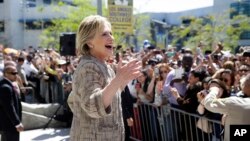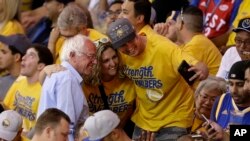Former U.S. secretary of state Hillary Clinton is nearing the Democratic presidential nomination, but she faces one last contentious political fight in California, the country's most populous state, against her sole challenger, Vermont Senator Bernie Sanders.
Clinton, looking to become the first female U.S. president, is very close to amassing a solid majority of delegates to the party's July national nominating convention. She has 2,310 of the 2,383 delegates she needs to be the first woman nominated for president by a major U.S. political party; Sanders has 1,542 pledged delegates.
Clinton, the top U.S. diplomat from 2009 to 2013, is likely to clinch the nomination June 7. This could come while Californians are still voting next week, since she is a heavy favorite in the eastern state of New Jersey, where polls close three hours before California.
Four other states also are holding nominating contests next Tuesday: Montana, New Mexico, North Dakota and South Dakota, but California is drawing the largest share of Clinton's attention. She has canceled scheduled campaign rallies elsewhere this week to return to the West Coast for a five-day swing through California.
She is hoping to avert an embarrassing popular-vote defeat in the biggest state, which would sting even though she would earn a sizable share of the state's 548 delegates to the Democratic national convention, allocated on a proportional basis.
Some political surveys show Clinton with a wide lead in California. Others say she is locked in a close contest with Sanders, a self-described democratic socialist who has attacked Clinton for her close ties to Wall Street financial chieftains and her past support for U.S. trade pacts with other countries that he says have cost American workers their jobs.
Clinton, 68, has amassed three million more votes than Sanders in the state-by-state nominating contests, but the 74-year-old Sanders has won substantially more support from younger voters and the party's most liberal wing.
Gubernatorial endorsement
California Governor Jerry Brown endorsed Clinton Tuesday, saying she has the best chance of defeating Donald Trump in the November general election. Billionaire real-estate mogul Trump appears certain to become the Republican Party's candidate to succeed President Barack Obama when he leaves office in January.
Brown repeated Clinton's claim that she has an insurmountable lead in the race to claim a majority of delegates to the Democrats' convention in July. However, that has not stopped Sanders' campaign in California, even though he has acknowledged there is only a "narrow path" remaining for him to claim the party's nomination.
During multiple campaign stops in California during the past week, Sanders has drawn larger and more enthusiastic crowds than Clinton has. The senator's message to voters, based on national public-opinion surveys, is that he would fare better against Trump in a general election than Clinton would.
Sanders has campaigned among unionized farm workers in central California, the region of fertile farmland that supplies a quarter of the country's produce. He denounced what he said was corporate greed that has allowed chemical contamination to make some public water supplies undrinkable.
At a rally with a group of Native Americans, more of whom live in California than anywhere else in the U.S., Sanders said, "All of you know the Native American people were lied to. They were cheated. Treaties they negotiated were broken from before this country even became a country. And we owe the Native American people a debt of gratitude we can never fully repay."
Ahead of next Tuesday's vote, California's 56 Democratic "superdelegates" - mostly local and state officials and activists who earn seats at the national convention automatically - have declared their support for Clinton; 17 others have not declared whether they support Clinton or Sanders. Clinton also is expected to draw substantial support in the state from Hispanic and black voters, as she has done throughout months of nationwide campaigning.





